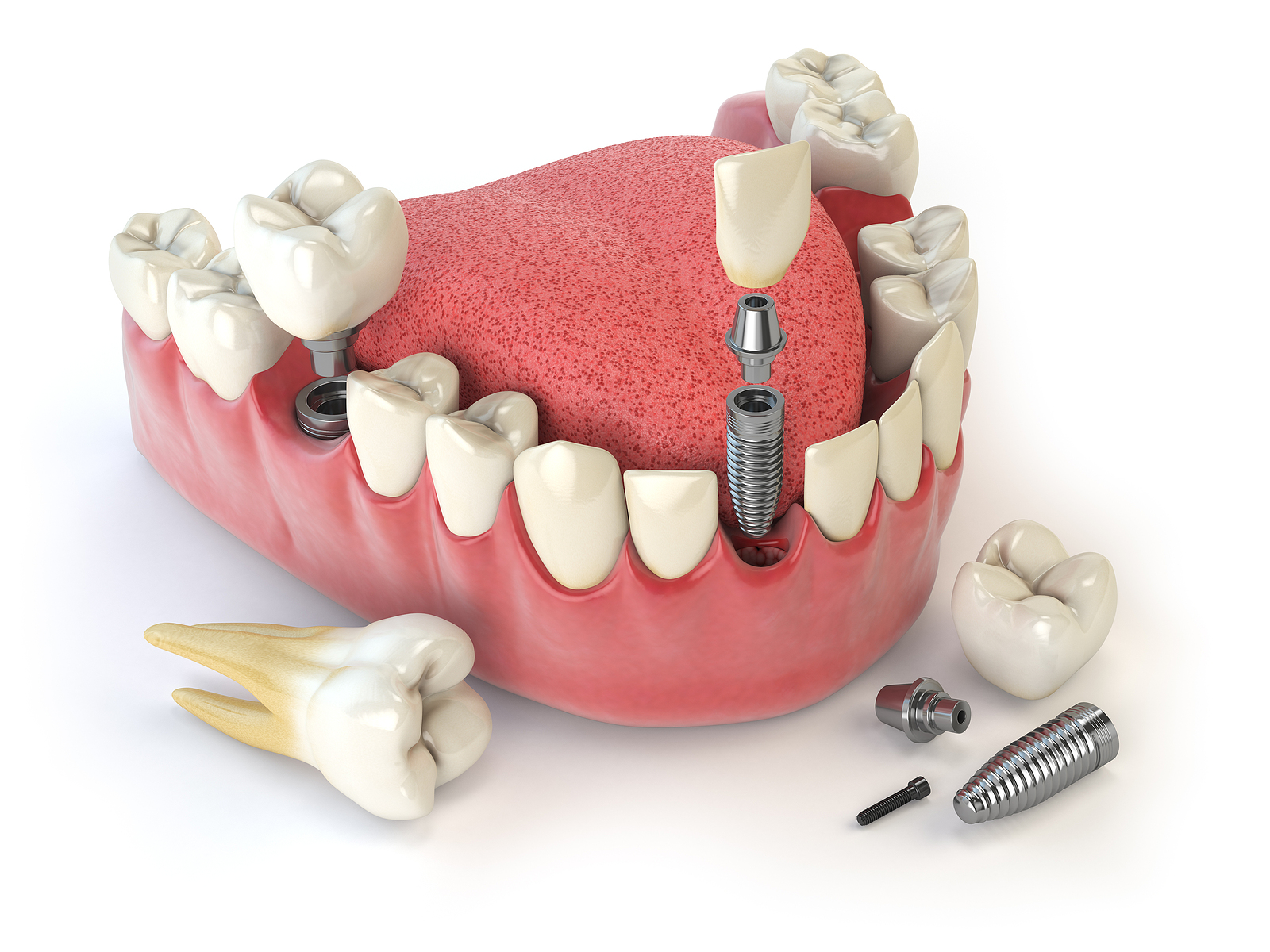Implant Supported Dentures
Implant-supported dentures are a dental solution designed to offer a stable and comfortable alternative to traditional removable dentures. Unlike conventional dentures, which rest on the gums and can shift or become loose, implant-supported dentures are anchored securely to dental implants placed into the jawbone. This provides a more reliable and functional restoration for patients with multiple missing teeth. The process involves surgically inserting titanium posts into the jawbone, which act as artificial roots. These implants integrate with the bone through a process called osseointegration, creating a strong foundation for attaching the denture. The denture itself is then custom-made to fit over these implants, either snapping into place or being permanently affixed. This approach offers several benefits, including improved stability, better chewing efficiency, and a more natural feel compared to traditional dentures. Implant-supported dentures also help preserve jawbone health by stimulating the bone and preventing deterioration, which is a common issue with tooth loss. Additionally, they enhance overall oral health by reducing the need for adhesive creams and the risk of gum irritation associated with removable dentures. For many patients, implant-supported dentures provide a more secure, comfortable, and aesthetically pleasing solution to missing teeth, significantly improving their quality of life.

How Do Implant-Supported Dentures Work?
The process begins with a comprehensive consultation with a dental professional. During this initial visit, the dentist in Riverside, CA, will conduct a thorough examination, including X-rays or Cone Beam Computed Tomography (CBCT) scans, to assess the jawbone's condition and surrounding structures. This diagnostic phase is crucial for determining whether implant-supported dentures are a suitable option and for planning the placement of the dental implants. The dentist will discuss the patient's needs, preferences, and expectations to tailor the treatment plan accordingly.
Once the treatment plan is established, the next step involves the surgical placement of dental implants. This procedure is typically performed under local anesthesia to ensure patient comfort. During the surgery, our dentist creates small incisions in the gum tissue to access the jawbone. Tiny holes are then drilled into the bone, and titanium implants, which resemble small screws, are inserted into these holes. The implants serve as artificial tooth roots, providing a stable foundation for the dentures. After placement, the incisions are sutured, and the healing process begins.
Following the implant placement surgery, a critical phase called osseointegration occurs. This is the process by which the dental implants fuse with the surrounding bone tissue. Osseointegration is essential for providing the necessary stability and support for the dentures. During this period, which typically lasts several months, the implants integrate with the jawbone, creating a strong and secure base. The duration of this phase can vary based on individual healing rates and bone quality.
Once osseointegration is complete, the dentist takes impressions of the patient's mouth to create custom-made dentures. These impressions are used to design and fabricate dentures that fit precisely over the implants. Depending on the treatment plan and patient preference, the dentures may be either fixed or removable. Fixed dentures are permanently attached to the implants and can only be removed by a dental professional, while removable dentures can be removed for cleaning and maintenance.
With the custom dentures prepared, the next step is attaching them to the dental implants. This involves placing abutments, small connectors, on top of the implants. The dentures are then secured to these abutments. For fixed dentures, this means permanently attaching them to the implants, ensuring a stable and comfortable fit. Removable dentures are designed to snap onto the abutments, allowing easy removal and cleaning while still maintaining a secure fit.
After the dentures are attached, the dentist will make any necessary adjustments to ensure optimal fit and function. This may involve fine-tuning the denture's alignment, bite, and comfort. Patients may need to visit the dentist for follow-up appointments to monitor the fit and address any issues that arise. The goal is to ensure that the dentures function properly and provide a natural feel and appearance.
Implant-supported dentures require regular maintenance to ensure their longevity and effectiveness. Patients should maintain good oral hygiene, including brushing and flossing, and follow the dentist's recommendations for cleaning and care. Regular dental check-ups are essential for monitoring the health of the implants, the fit of the dentures, and overall oral health. Proper care helps prevent complications and ensures that the implant-supported dentures continue to function well for many years. Contact us today to learn more.
Benefits of Implant-Supported Dentures
- The primary benefit of implant-supported dentures in Riverside, CA, is their superior stability. Unlike traditional dentures that can shift or slip, implant-supported dentures are securely anchored to the implants, providing a more comfortable and reliable fit. This stability improves chewing efficiency and reduces the risk of discomfort or embarrassment.
- With implant-supported dentures, patients can enjoy better functionality compared to conventional dentures. The secure fit allows for more effective chewing and biting, enabling individuals to eat a wider variety of foods with confidence.
- Dental implants stimulate the jawbone, helping to maintain its density and prevent bone loss that commonly occurs with missing teeth. This preservation of bone structure supports the facial contours and prevents the sunken appearance often seen with traditional dentures.
- Implant-supported dentures are designed to closely mimic the appearance of natural teeth. The custom fabrication ensures that the dentures blend seamlessly with existing teeth, providing a natural-looking and aesthetically pleasing result.
- While traditional dentures may require adhesives and frequent adjustments, implant-supported dentures offer a more convenient and hygienic solution. Removable options are easily cleaned, and the absence of adhesives reduces the need for additional maintenance.
Implant-supported dentures represent a significant advancement in restorative dentistry, offering a stable, comfortable, and aesthetically pleasing solution for replacing missing teeth. Visit Premium Smile Care at 9825 County Farm Rd Bldg B, Riverside, CA 92503 or call (951) 324-1212 to schedule a consultation and learn how this innovative option can transform your dental health and restore your smile.
Visit Our Office
Office Hours
- MON7:00 am - 3:00 pm
- TUE7:00 am - 3:00 pm
- WED7:00 am - 3:00 pm
- THUClosed
- FRI7:00 am - 3:00 pm
- SATAppointment Only
- SUNClosed

